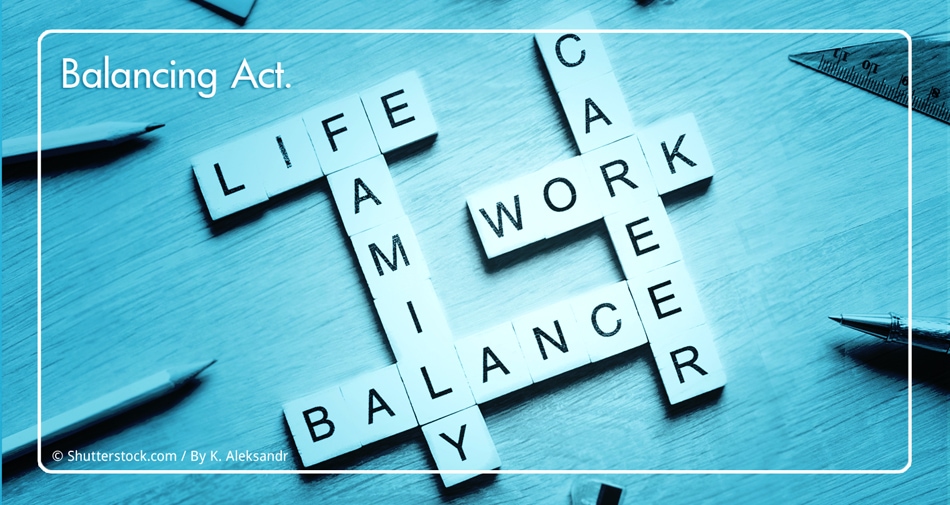
Balancing Act.
by Darlene Tonelli, July 10, 2019.
In this post, I’m looking at how “life outside the office” is treated in a traditional law firm model, and the way heightened status is afforded to those who sacrifice their lives to meet the objectives of the firm.
The messaging starts early in law school. Through the prevalence of law firms around the school/dinners/recruiting/quick conversations with law firm partners who tell you they miss their kids, etc., I came to believe that “work-life balance” meant jamming in a few “non-work” items around my work hours.
For example – work all day, and then try to optionally fit in the gym, or see friends, work-permitting. Work-life balance meant trying not to bail on ALL outside-of-work plans… (just a high percentage of them), or trying to keep SOME of your outside-of-work obligations, instead of none of them.
Obviously, someone who hasn’t been subjected to the messaging referenced above might think this is a bit crazy. But, within law, isn’t this what the norm is? Work is the main event, and life is whatever fits around it?
The priorities implicit here are that money and the demands of work colleagues and clients take precedence over everything else. Work in the front seat. Family, health, community service, and everything else in the backseat. And I believe our entire society is suffering as a result. When I was a kid, we read the story “A Christmas Carol” and thought Scrooge was mean, sad, greedy and lonely. Now he might be considered a kind of hero, with his fancy house on his Instagram profile and his record profits.
The sad thing about this set-up is there are lots of lawyers out there who could capably meet a client’s legal needs – even ‘good’ lawyers are often interchangeable with other good lawyers. But there is only one person who can serve the other roles in your life – spouse to your partner; mom or dad to your children; daughter or son to your parents; best friend to your best friend. There are only so many special moments or events per child in their lifetime. And at the end of your life, it will probably be the people on this list, from your family and friend group, who will be there with you. A lot about those final moments will depend on how much time you invested in upkeep of those relationships throughout your life.
Maybe your clients will be there – or maybe (and more likely) they’ll be working with a new lawyer because the work has to get done and you can no longer do it.
If we’re somewhat interchangeable, why do we tell ourselves we’re so important that we have to prioritize work above all else? That we always have to make trade-offs to the detriment of those who love us the most?
I think the reason is an enshrined support for what people “know” works – e.g. large number of hours billed covers overhead and leaves room for profit, and we collectively fear any departure from this successful model. There may also be fear of what will happen if people are given the freedom to make personalized choices about how to achieve their objectives both at work and outside work.
Contrary to the prevailing opinion in many firms and workplaces, though, I don’t think supporting a balanced and healthy life is a licence to slack off. There are slackers who put in tonnes of face time and take ages to do things that should be done much more efficiently. Top performers, in my experience, over-deliver both at home and at work, if given the chance. And in the long-run, that type of performance is more valuable on any model.
It’s imperative that lawyers start taking a serious look at how the business model requires people to sacrifice the very things in life that are truly the most meaningful. And then ask whether this really is necessary.
At Inter Alia, we built our business model around what works for lawyers and clients. Our model is designed to empower lawyers to exert an extremely high degree of control over their practice and their lifestyle, and we ensure that the culture embraces having a life outside the office just as much as delivering a high level of performance on our files. It’s as peaceful a way to practice law as I believe exists.
We need to prioritize a full life with work taking its proper place. Why? For one reason, having the greatest job in the world isn’t that great when your personal life is crumbling, or you’re starting to think you may not be able to have children, or your health is at risk.
I’d like to see more firms making role models of the lawyers who are truly making great lives while practicing law. The ones who are there for their families AND who get their work done. Not just the ones who have outsourced the care of their children, or are fortunate enough to have a stay at home spouse. The ones who are there for the baseball games and the school plays and pulling some late nights to make it work. I’d like to hear more from them about how they achieve excellence across the board, and less from the people who work to the exclusion of everything else.
When I talk about balance, I don’t see an image in my mind of equal balance like the scales of justice. I see something more like a see-saw that can adjust to the most pressing needs of the moment (the stuff that truly matters), without being always in perfect equilibrium. Maybe if we can adjust our expectations of what balance is, it will feel more like something we can (and want to) achieve within a law firm business model.
We welcome your input at any time.
Find us on Twitter, LinkedIn and Instagram or listen to us talk more about these ideas on the Lawyer Life Podcast (LLP).

